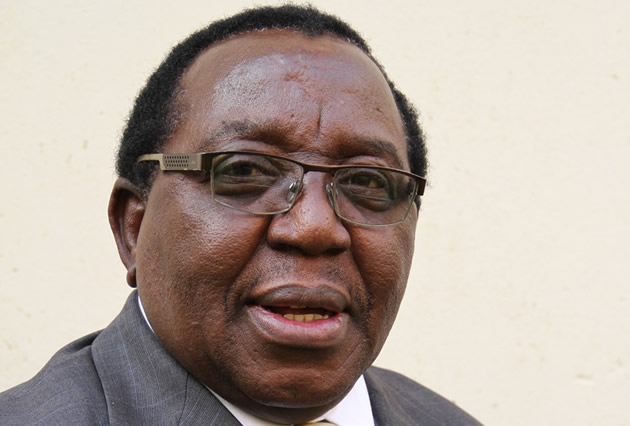ZNA embraces farming


ZNA members who graduated with Master Farmers certificates from the Domboshava National Training Centre
Talent Chimutambgi Review Correspondent
Agriculture is the most significant economic sector as it has the potential to rapidly address poverty and hunger that any country might face.
This was revealed by Commander of Artillery Brigade, Brigadier General Stanley Mangena in his address to mark the graduation ceremony of 51 uniformed forces who recently completed Masters Farmers Course at Domboshava National Training Centre on the outskirts of Harare.
Among the graduate farmers, 49 were members of the Zimbabwe National Army (ZNA) drawn from different units and formations across the ZNA, and two from the Zimbabwe Republic Police (ZRP).
Brig Gen Mangena said the graduation has accomplished the vision of ZNA Commander Lieutenant General Philip Valerio Sibanda of preparing and equipping uniformed forces with the pre-requisite skills to sustain themselves and the country after retirement.
He said the graduate farmers should strive to reinforce robust economic growth and bring meaningful changes through implementing the knowledge they acquired at the training college.
“Agriculture is the cornerstone of the country’s economy. The Zimbabwe National Army is working flat out to ensure that Zimbabwe retains its bread basket status in Africa through implementing government programs which are aimed at tackling food insecurity in the country.
“There is need to revolutionise agriculture to eliminate hunger. We should be at the epicentre of the country’s efforts to end food insecurity,” he said.
He spoke of the army was involved in various production initiatives apart from military operations.
“Currently the Zimbabwe Defence Forces is involved in the construction of schools and clinics as well as humanitarian work of removing landmines along our country’s borders planted by the brutal Ian Smith regime to inhibit freedom fighters from crossing into our neighbouring countries to receive military training.
“We need to come together and realise that we are under siege through the illegal economic sanctions and we need to tackle all the problems we face head-on by supporting Government programmes such as Command Agriculture and the Presidential Inputs Support Scheme that are meant to bring economic revival,” he said.
Domboshava National Training Centre has become a cradle for the best farmers in the uniformed forces since the introduction of the Masters Farmers’ Course in 2000 during the period of the then Commander of Artillery Brigade, Rtd Major General Etherton Shungu.
Rtd Maj Gen Shungu realised that most members who acquired farms through the Land Reform Programme lacked the technical know-how to successfully carry out farming activities.
He collaborated with Domboshawa Training Centre to enrol militants to acquire the requisite knowhow in farming.
Brig Gen Mangena said the Master Farmers programme which is being spearheaded by Headquarters Artillery Brigade was in line with the vision of the commander of ZNA Lt Gen Sibanda which has seen eight groups so far graduating since its inception.
“It is important to note that the course is in accordance with the Commander Zimbabwe National Army Training Directive especially in preparation and equipping officers and men with the prerequisite knowledge after retirement,” he said.
Principal Agriculture Extension Specialist in the Ministry of Agriculture, Mechanisation and Irrigation Development stationed at Domboshava National Training College, Mr Smith Nyatsande narrated how the programme started.
“Comrade Shungu (Rtd Maj Gen Shungu) consulted the college staff in 2000 after he discovered that most of the uniformed forces who retire from various Government organisations will be destitute when they retire.
“He invited the college staff to Headquarters Artillery Brigade to address soldiers on the various courses we offer, both long and short farming courses. Soldiers then chose the two-year Master Farmers Course,” said Mr Nyatsande.
He said the course was designed to equip officers with the basic knowledge and skills of farming and boost production in the country, adding the certificates were recognised both within and outside in countries like Botswana where graduate farmers were being appointed foremen in line with the knowhow they have.
Speaking at the same occasion, Mr Nyatsande told the graduates the importance of the course.
“The course was designed to raise the level of competence in farming methods, hence you were equipped with the basic knowledge of crop and animal husbandry which you will implement in your farms and plots availed to you by the Government through the Land Reform Programme.
“We will be mocked by other countries if we are a famine dominated country. I can say we will continue to churn out products with real knowhow,” he said.
He added that farmers should be equipped with knowledge so that they follow the changing weather patterns.
One of the graduates, Mrs Mercy Katuka, applauded the ZNA Commander for such an initiative, saying the skills and knowledge she acquired during the the course would go a long way in enhancing her farming activities at her farm in Mvurwi.
“I want to thank the Commander of the Zimbabwe National Army Lt Gen Sibanda for supporting such a crucial programme. We have attained the requisite knowledge here at the college which include crop production, livestock production, apiculture (bee keeping), crocodile keeping, and fish production.
“I have a 30-hectare farm in Mvurwi which I wasn’t fully utilising but now I can confidently say that with the knowledge we gained here I will do wonders at my farm,” she said.
Mrs Katuka pledged that she would participate actively in the Command Agriculture programme to combat hunger, adding she will use the skills she acquired to assist other farmers in her area.
She said she was interested in honey production.
“Honey production requires low capital. Again honey has several uses which include making of wax which produces floor and shoe polish, it has a high nutritional value and it is used to add energy to the old age,” said Mrs Katuka.
Another graduate, Mr Brighton Masamba said the course has made him a better farmer.
“During the training I learnt that farming requires planning, and planning requires time.
“If you want to be a successful farmer you need to plan in time, but now I can boast that I am now an active participant in returning Zimbabwe to its bread basket status,” he said.
Artillery Brigade Education Officer Major Peter Mhatiwa said the course was designed to benefit uniformed forces forever, adding that the knowledge being acquired at the college resonates with the changing weather patterns.
“There is certain level of competence and skill that farmers should have which are in line with new technology.
The way these subjects are taught should prepare farmers for self-reliance. The aim is also to prepare farmers for life and work in an indigenised economy and competitive environment and ensuring farmers demonstrate knowledge and skill necessary for life,” said Major Mhatiwa.
He said the graduates were expected to be ambassadors of seed houses which are regulated by Agritex to boost farming in their areas.
He added that those without farms should register so that they will be allocated land, a move which would see the country continuing to register bumper harvests every year.







Comments